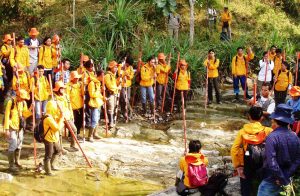Homepage : http://geology.fitb.itb.ac.id/

In general, geology is the science that studies the earth. Geological studies study various types of rocks and the relationship of one type of rock to another type, the condition of the inside and the face of the earth and the processes or mechanisms of its formation, to then interpret its geological history in a certain space and time.
In its development, geology has many roles as a vehicle for assessment and utilization of various resources, such as minerals, energy, and water. In addition, the application of geology in engineering and the environment and the mitigation of natural disasters at this time has also developed rapidly.
Geological Engineering Study Program FEST – ITB, as the oldest geological higher education institution in Indonesia, should be able to become a foundation in planning and development, information sources and problem solving in geological and applied sciences for government agencies and industry. Therefore, the Geological Engineering Study Program must be able to produce graduates who are skilled and able to grow and develop in various related disciplines and are able to cooperate with other disciplines. Thus the Bachelor of Geological Engineering Study Program in its educational activities aims to produce graduates who have the basic provision of strong science and skills in order to be able to observe, recognize, and approach problem solving in the field of science in a scientific and full of initiative, flexible to adapt to technological developments , and also able to develop their knowledge at a higher level of education.
The curriculum of the Bachelor of Geology Study Program consists of 36 credits of Joint Preparation Course (TPB), 78-80 credits of compulsory subjects, 10 credits of compulsory ITB courses, a minimum of 18-20 credits of elective courses. A student is declared graduated if he has taken as many as 144 credits. The final project of the Bachelor of Geology Engineering Study Program is in the form of geological studies of a particular area that can be done in the form of mapping or without mapping, with or without deepening a particular topic, the results of which are written as a thesis.


Facilities
Geological education support facilities in the Geology Engineering Study Program include laboratories and studios, including the Geodynamic Laboratory (Geomorphology Lab, Structural Geology Lab, Remote Sensing Studio, Sandbox Modeling Lab), Engineering Geology Laboratory (Engineering Geology Lab, Environmental Geology Studio , Lab. Hydrogeology), Laboratory of Petrology and Volcanology (Optics and Petrography Minerals Laboratory, Lab. Mineral Deposition, Volcanology and Geothermal Lab, Geochemistry Lab), Sedimentography Laboratory (Lab High Resolution Stratigraphy (HIRES), Subterranean Studio, Oil and Gas Energy Studio), Paleontology Laboratory (Paleontology Lab, Micropaleontology Lab), and Computational Geology Laboratory.
In addition, the Geology Engineering Study Program is also supported by the Klompe Library, with a collection of literature and journals in the field of geology, as well as facilities for LAN (Local Area Network) 20 PCs and 10 Workstations.
